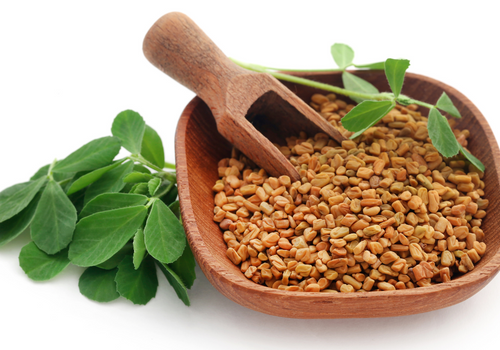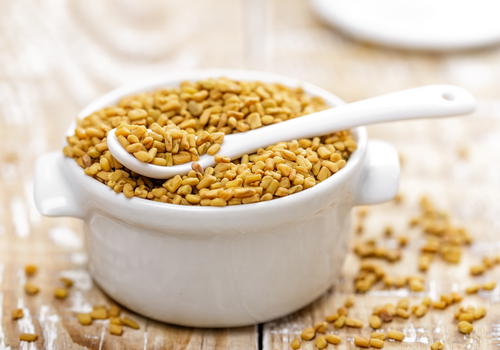There is a lot of debate surrounding the topic of Fenugreek and testosterone levels in men. Some people say it actually increases testosterone production, while others claim that it does nothing at all. So does Fenugreek increase testosterone levels in men?
The evidence from studies on men is mixed.
Some studies show that Fenugreek does increase testosterone levels, while other studies show that it does not have any effect.
The most likely explanation is that Fenugreek does indeed increase testosterone levels, but the effects are small.
If you are looking for a way to increase your testosterone levels, there are better ways than taking Fenugreek alone.
The most effective way to increase testosterone levels is to use a testosterone booster that contains Fenugreek and other proven ingredients that will naturally elevate your T levels.
In this comprehensive guide, we will take a look at all of the scientific evidence surrounding Fenugreek and testosterone levels in men. We will also discuss the potential side effects of taking Fenugreek supplements.
By the end of this article, you will have a clear understanding of whether or not Fenugreek can help to increase your testosterone levels.

What is Fenugreek?
Fenugreek is an herb that has been used in traditional medicine for a long time. It is from the Mediterranean region and India.
People in those places have used Fenugreek for a long time to stay healthy. The most common way to use Fenugreek is by drinking it as tea or eating it as a powder.
Some people think that the health benefits of Fenugreek come from a compound called fenusides. This compound is found in the seeds of the Fenugreek plant. Some potential health benefits of Fenugreek include better blood sugar control, reduced inflammation, and improved libido.
This herb is sometimes taken as a supplement. It is usually sold in pill form, but it can also be found in powder form. Fenugreek supplements are popular among bodybuilders and people who want to improve their athletic performance.
This is because this herb is thought to increase testosterone levels. Testosterone is a hormone that is important for muscle growth and it also helps improve libido and increase energy levels.
On top of that, Fenugreek supplements are also sometimes taken by people who have diabetes. This is because Fenugreek can help to lower blood sugar levels.

What Do Studies Say About Fenugreek and Testosterone?
Plenty of research on Fenugreek and testosterone has been done on animals:
- One rat study that Fenugreek does increase testosterone levels in rats. The study found that rats who were given Fenugreek had higher levels of free and total testosterone than rats who were not given the herb.
- Another animal study found that Fenugreek does not increase testosterone levels in rabbits. This study found that there was no difference in testosterone levels between rabbits who were given Fenugreek and rabbits who were not given the herb.
There have been a few studies conducted on humans to see if Fenugreek does indeed increase testosterone levels:
- The Journal of the International Society of Sports Nutrition published a study that looked at 49 healthy and fit men. The men were given either a placebo or 500 mg of Fenugreek extract for 8 weeks. The group that took the Fenugreek extract had significantly higher levels of free and total testosterone levels than the placebo group.
- Another research involving men aged 35-65 observed the effects of 500 mg Fenugreek for 12 weeks. The men who took the Fenugreek extract saw a significant increase in testosterone levels, sperm quality, mental alertness and overall performance.
- Another study published in the Aging Male journal looked at the effects of 600 mg of Fenugreek on older men aged 43 to 75 for 12 weeks. The results showed an increase in both free and total testosterone levels in those who used the extract for 12 weeks.
However, some studies found that Fenugreek doesn’t actually increase testosterone levels in humans:
- The International Journal of Exercise Science examined the effects of 600 mg of Fenugreek for 6 weeks on men who train regularly. Turns out that after 6 weeks of taking the extract there was no effect on the testosterone levels of the men involved in the study.
These studies seem to suggest that Fenugreek does increase testosterone levels in humans, but the effects are small.
Again, you shouldn’t expect steroid-like results from dietary supplements.
Does Fenugreek Help with Erections?
Some people use Fenugreek to help with erection. There is some evidence that Fenugreek does indeed improve erectile function.
One study found that men who took Fenugreek supplements for six weeks had improved erectile function. The study also found that the men who took Fenugreek had increased levels of free and total testosterone levels.
Another study looked at the effects of Fenugreek on sexual function in postmenopausal women.
The study found that the women who took Fenugreek had improved sexual function compared to the women who did not take the herb.
Fenugreek Side Effects
Fenugreek is generally considered to be safe.
The most common side effects are digestive problems like bloating, gas, diarrhea and if you are allergic to Fenugreek, you may have an allergic reaction that includes itching, swelling, and difficulty breathing.
If you have diabetes, it is important to talk to your doctor before taking Fenugreek supplements because they can lower blood sugar levels.
You should also talk to your doctor if you are taking any medications that could interact with Fenugreek supplements. Some of these medications include blood thinners and cholesterol-lowering drugs.

How to Take Fenugreek?
Here’s how to take Fenugreek depending on the form:
- Supplement (capsules) – The common dose is 3 capsules of around 600 mg of Fenugreek extract per day. It is recommended to take Fenugreek supplements with food.
- Powder – It’s recommended to take 1 teaspoon of Fenugreek powder 2 to 3 times per day. You can add the powder to water or juice and drink it. If you don’t want to drink it, you can also add the powder to food like soups, stews, or curries.
- Tea – If you want to make a Fenugreek tea, you can steep 1 teaspoon of Fenugreek powder in hot water for 5 minutes. You can also add honey or lemon to the tea to make it tastier.
It is also important to make sure that you are taking a high-quality Fenugreek supplement. Look for a supplement that is made from organic Fenugreek seeds and one that does not contain any fillers or additives.
How Long Does it Take for Fenugreek to Work?
The effects of Fenugreek can vary from person to person. Some people may notice the effects of Fenugreek within a few weeks, while it may take longer for others to notice any changes.
Keep in mind that it can take a few weeks for Fenugreek to start working. This is because Fenugreek needs time to build up in your system before it starts having an effect.
Conclusion
Fenugreek is a very popular herb that has been used for a very long time (centuries in fact).
Some people think it might help increase testosterone levels in both rats and humans, although the effects seem to be more pronounced in those with low testosterone levels.
Fenugreek is generally considered safe, but there have been no reports of serious side effects. So if you want to try Fenugreek to see if it increases your testosterone levels, it is probably worth a shot.
Just make sure to buy a high-quality supplement and start with a lower dose to see how you tolerate it.
Fenugreek is generally safe but it does have some side effects like bloating and gas, so keep that in mind.
FAQs
What is Fenugreek, and how does it affect testosterone levels in men?
Fenugreek is a herb commonly used in traditional medicine to boost testosterone levels.
It contains compounds called furostanolic saponins, which are believed to stimulate the production of testosterone.
Studies have shown that fenugreek supplementation can increase free testosterone levels in men, which may lead to improved athletic performance and sexual function [5].
What is the recommended dosage of fenugreek for boosting testosterone levels in men?
The recommended dosage of fenugreek for increasing testosterone levels in men is around 500-600mg per day.
However, the optimal dosage may vary depending on the individual’s age, weight, and overall health.
It is recommended to consult with a healthcare provider before starting fenugreek supplementation.
Are there any potential side effects of fenugreek supplementation?
Fenugreek supplementation is generally considered safe for healthy individuals.
However, some people may experience mild side effects such as digestive issues, diarrhea, or bloating.
High doses of fenugreek may also cause a maple syrup-like smell in urine or sweat.
Individuals with diabetes or hypoglycemia should be cautious when taking fenugreek, as it may lower blood sugar levels.
How long does it take for fenugreek supplementation to boost testosterone levels in men?
Research suggests that it may take several weeks of consistent fenugreek supplementation to see an increase in testosterone levels.
One study found that men who took fenugreek for six weeks experienced a significant increase in free testosterone levels compared to a placebo group [10].
However, the time it takes to see results may vary depending on the individual’s starting testosterone levels and overall health.
Can fenugreek be used as a natural alternative to testosterone replacement therapy?
While fenugreek may increase testosterone levels in men, it should not be used as a replacement for testosterone replacement therapy (TRT) prescribed by a healthcare provider.
TRT involves the use of synthetic testosterone to treat low testosterone levels, which can be caused by a variety of factors such as aging or medical conditions.
Fenugreek may be used as a natural supplement to support overall testosterone levels in healthy individuals, but it is not a substitute for medical treatment.
References:
- Gaddam A, Galla C, Thummisetti S, Marikanty RK, Palanisamy UD, Rao PV. Role of Fenugreek in the prevention of type 2 diabetes mellitus in prediabetes. J Diabetes Metab Disord. 2015 Oct 2;14:74. doi: 10.1186/s40200-015-0208-4. PMID: 26436069; PMCID: PMC4591578.
- Straftis AA, Gray PB. Sex, Energy, Well-Being and Low Testosterone: An Exploratory Survey of U.S. Men’s Experiences on Prescription Testosterone. Int J Environ Res Public Health. 2019 Sep 5;16(18):3261. doi: 10.3390/ijerph16183261. PMID: 31491933; PMCID: PMC6765788.
- Effect of furostanol glycosides from Trigonella foenum-graecum on the reproductive system of male albino rats(Article), Phytotherapy Research, Volume 24, Issue 10, October 2010, Pages 1482-1488
- S. K. Abd ; A.R.Hamowieh; A. Al-Abd .(2009). Effect of fenugreek on Testosterone level and seminal fluid parameters in males Rabbits. Al- Baath University Journal, Vol. (31), No. (1).
- Poole C, Bushey B, Foster C, Campbell B, Willoughby D, Kreider R, Taylor L, Wilborn C. The effects of a commercially available botanical supplement on strength, body composition, power output, and hormonal profiles in resistance-trained males. J Int Soc Sports Nutr. 2010 Oct 27;7:34. doi: 10.1186/1550-2783-7-34. PMID: 20979623; PMCID: PMC2978122.
- Maheshwari A, Verma N, Swaroop A, Bagchi M, Preuss HG, Tiwari K, Bagchi D. Efficacy of FurosapTM, a novel Trigonella foenum-graecum seed extract, in Enhancing Testosterone Level and Improving Sperm Profile in Male Volunteers. Int J Med Sci. 2017 Jan 10;14(1):58-66. doi: 10.7150/ijms.17256. PMID: 28138310; PMCID: PMC5278660.
- Rao A, Steels E, Inder WJ, Abraham S, Vitetta L. Testofen, a specialised Trigonella foenum-graecum seed extract reduces age-related symptoms of androgen decrease, increases testosterone levels and improves sexual function in healthy aging males in a double-blind randomised clinical study. Aging Male. 2016 Jun;19(2):134-42. doi: 10.3109/13685538.2015.1135323. Epub 2016 Jan 20. PMID: 26791805.
- Bushey, Brandon; Taylor, Lem W.; Wilborn, Colin W.; Poole, Chris; Foster, Cliffa A.; Campbell, Bill; Kreider, Richard B.; and Willoughby, Darryn S. (2009) “Fenugreek Extract Supplementation Has No effect on the Hormonal Profile of Resitance-Trained Males,” International Journal of Exercise Science: Conference Proceedings: Vol. 2: Iss. 1, Article 13.
- Available at: https://digitalcommons.wku.edu/ijesab/vol2/iss1/13
- Steels E, Rao A, Vitetta L. Physiological aspects of male libido enhanced by standardized Trigonella foenum-graecum extract and mineral formulation. Phytother Res. 2011 Sep;25(9):1294-300. doi: 10.1002/ptr.3360. Epub 2011 Feb 10. PMID: 21312304.
- Khanna, A., Thomas, J., John, F. Safety and influence of a novel extract of fenugreek on healthy young women: a randomized, double-blinded, placebo-controlled study. Clin Phytosci 7, 63 (2021). https://doi.org/10.1186/s40816-021-00296-y
- Kiss R, Szabó K, Gesztelyi R, Somodi S, Kovács P, Szabó Z, Németh J, Priksz D, Kurucz A, Juhász B, Szilvássy Z. Insulin-Sensitizer Effects of Fenugreek Seeds in Parallel with Changes in Plasma MCH Levels in Healthy Volunteers. Int J Mol Sci. 2018 Mar 8;19(3):771. doi: 10.3390/ijms19030771. PMID: 29518003; PMCID: PMC5877632.
- https://www.healthline.com/nutrition/fenugreek-for-testosterone
I've been fascinated by natural male hormone optimization since 2016. And ever since I've been going through boatloads of different meta-analyses and scientific data associated with increasing testosterone levels naturally. I hold a PhD degree in public health and have 10+ scientific publications on Google Scholar. Thus, in my collective work here you'll find helpful tricks, natural remedies, detailed product reviews (including stuff I've personally tried)... and more!




